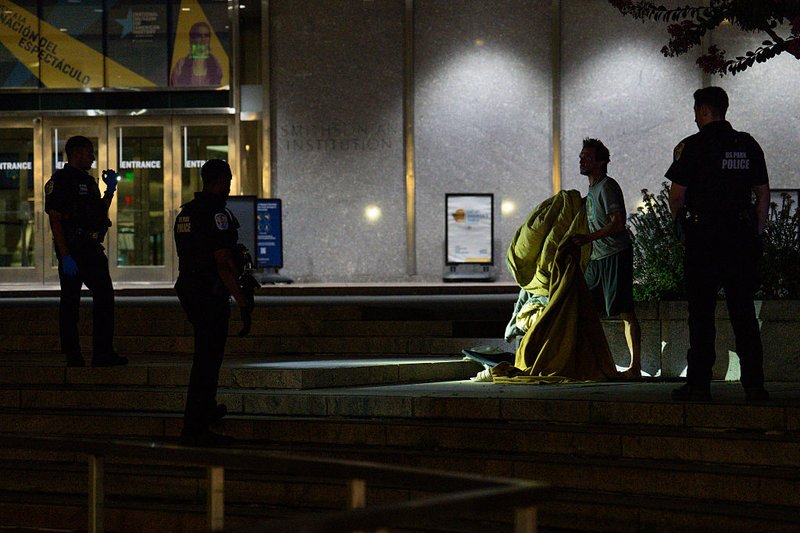Trump’s Occupation of DC Undermines Proven Housing Solutions
Article In The Thread

Kayla Bartkowski / Stringer via Getty Images
Sept. 11, 2025
In recent weeks, federal law enforcement officers and the local police forced to collaborate with them have harassed, threatened, and displaced Washingtonians experiencing homelessness. Although no arrests have been reported to date, President Trump and his allies, including DC Mayor Muriel Bowser—who ordered indefinite local coordination with federal law enforcement—are advancing a violent, expensive, and flawed approach to the urgent reality that nearly 10,000 individuals in the DC metro area are experiencing homelessness.
At every turn, our leaders are focusing on the wrong part of the issue and ignoring the facts. Trump has framed his administration’s terrorization of unhoused Washingtonians as offering them a “choice” between arrest and shelter. But in reality, nearly 93 percent of homeless survey respondents said they would move inside if safe, affordable housing were available, according to a Seattle-based assessment. Sure, DC has made additional shelter beds available with the city’s own limited funds—but many avoid staying in shelters due to the lack of autonomy and privacy. And in any case, short-term shelter is rarely a pathway out of homelessness. Actual housing is.
“Short-term shelter is rarely a pathway out of homelessness. Actual housing is.”
An evaluation of homeless services in Denver, Colorado, illustrates this clearly: Only 18 percent of people who received “services as usual” (including temporary shelter) were housed for any amount of time during a three-year period. By contrast, 80 percent of people who entered permanent supportive housing, or PSH, the gold standard of evidence-based intervention that pairs housing with wraparound resources such as counseling and healthcare, were housed—and 77 percent remained stably housed at the end of the three years. PSH participants also had significantly fewer shelter stays (down 40 percent compared to those who only received the usual services), police interactions (down 34 percent), arrests (down 40 percent), days in jail (down 27 percent), and use of detoxification services (down 65 percent). These extraordinary improvements in program participants’ quality of life also produced significant cost savings for Denver’s local government, helping to offset the program’s expense.
In my former home of Houston, Texas, the regional Coalition for the Homeless of Houston/Harris County committed to scaling permanent supportive housing as part of a broader overhaul of the homelessness response system. Since implementing those reforms in 2011, Houston has reduced homelessness by approximately 60 percent. While the approach is not perfect—thousands of Bayou City residents remain unhoused—the coalition’s sustained focus on PSH has helped house thousands and is lauded as a national model.
“At every turn, our leaders are focusing on the wrong part of the issue and ignoring the facts.”
Alarmingly, in July, President Trump signed an Executive Order ending federal prioritization of “housing first” supports like permanent supportive housing, a policy approach that began in the George W. Bush administration. Meanwhile, DC’s mayor and council also seem to be missing the urgency of investing in this type of support. Their respective versions of the Fiscal Year 2026 budget—which has yet to be finalized—largely favor temporary fixes over long-term housing solutions. The DC Fiscal Policy Institute, a leader in progressive and racially just policy recommendations, released a slate of key budget asks to address homelessness, including funding for rental assistance, PSH, shelters, and street outreach services. Yet both the mayor’s proposal and the council’s approved budget fall short: They include no new permanent supportive housing vouchers for chronically homeless individuals and only 8.6 percent of the recommended emergency rental assistance. Fortunately, both branches did meet the suggested asks for shelter funding.
But look at the bigger picture: While shelter access is a critical lifeline for many unhoused individuals and families, increasing spending on shelters alone cannot end homelessness. And neither will criminalizing people for the fact of living on the streets.
You May Also Like
Encampment Cleanups Aren’t the Answer: Bridging the Gap Between Housing Loss and Homelessness (The Thread, 2025): After Trump’s notice, DC sped up homeless encampment removals. Tim Robustelli urges better eviction data to tackle housing instability.
The Dilemma of Jury Duty in Trump and Jeanine Pirro’s DC (The Thread, 2025): After jury duty in DC, a city overtaken by force, policy expert Mark Schmitt reflects on civic trust and responsibility under Trump’s rule.
Follow The Thread! Subscribe to The Thread monthly newsletter to get the latest in policy, equity, and culture in your inbox.